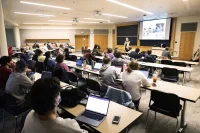
When the Bates student EcoReps encounter a sustainability problem that needs solving, they don’t sit idle and debate — they get into gear and execute solutions.
In two of their most recent successes, the students helped to secure funding to solve an unexpected problem with the existing electric vehicle chargers on campus and to purchase a slew of new EVs for campus use.
“It’s really cool that as students, I feel like we have a voice,” says Martin Carriere ’25, an EcoRep from Davis, Calif. “I always feel like our ideas are heard. We’re positioned to have bolder ideas and be able to bring those to the table.”
Bates is known for its impressive achievements in sustainability, but the existential threat of climate change gives expanding the work great urgency. Carriere, a double major in politics and environmental studies, and fellow EcoRep Cassidy Meyer ’25, an environmental studies major from Carbondale, Colo., are both set to graduate this month — and both are working on sustainability solutions right until the end.
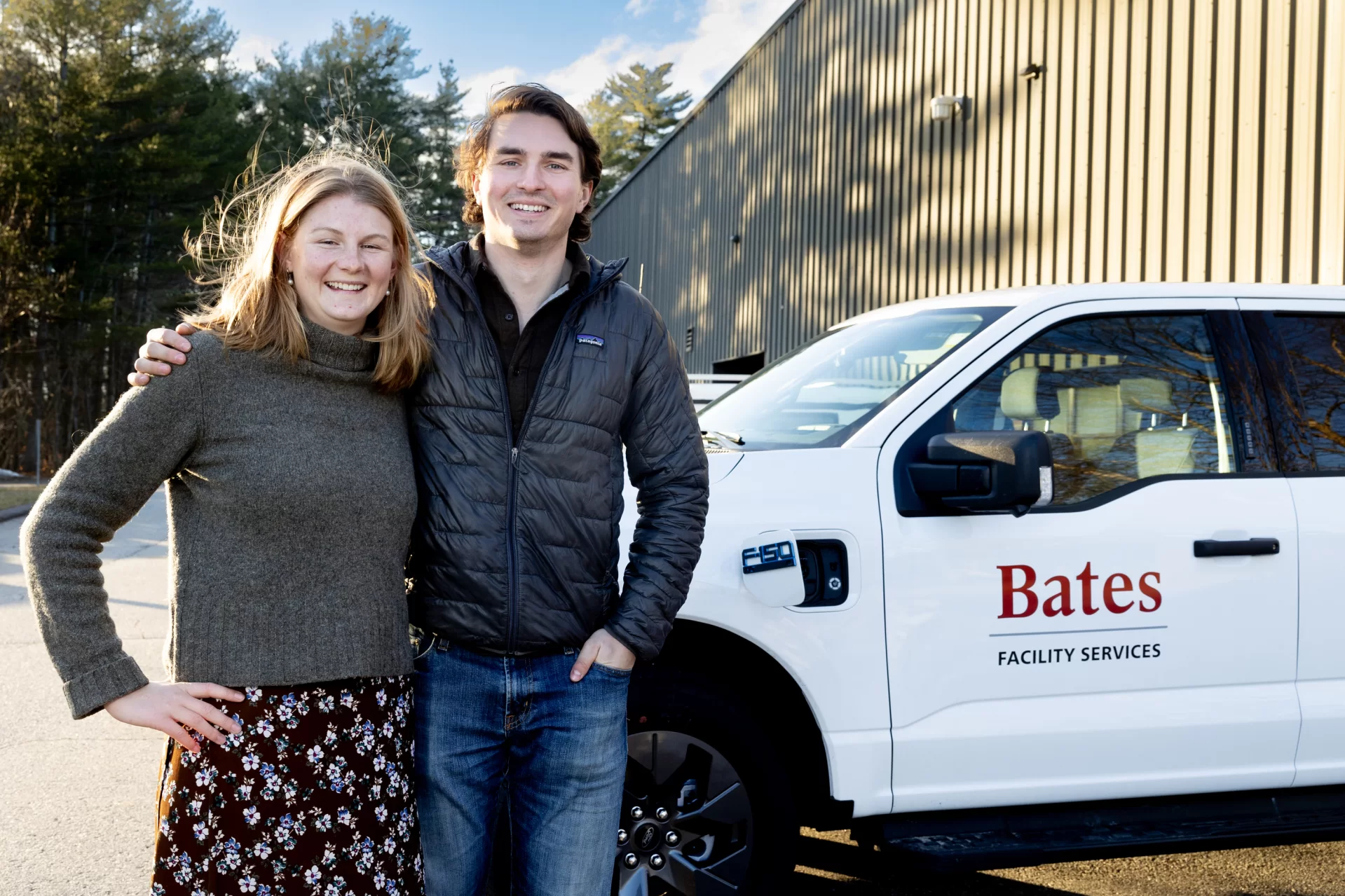
The pair even squeezed in a meeting with college leaders on local renewable energy during their last week of classes, amid the haze of studying for finals and saying goodbyes.
Carriere, Meyer, and Izzy Larson ’25 of East Aurora, N.Y., comprise the Energy Solutions Group within the EcoRep program, which provides hands-on opportunities for students to work on sustainability and environmental issues on campus.
The three seniors are also members of the college’s Committee on Environmental Responsibility, a working group of faculty, staff, and students charged with enacting Bates’ Sustainability Roadmap. The ambitious plan outlines the steps required to meet the college’s goal of becoming climate positive by 2030.
Bates is one of about only 15 U.S. colleges and universities that are carbon neutral, meaning they produce net-zero carbon emissions. The college reached this milestone ahead of schedule in 2019 and now aims to become climate positive through sequestering more carbon than it produces.
In alignment with the college’s sustainability goals, Bates has incrementally expanded on-campus infrastructure for electric vehicles and currently has 12 publicly-available EV chargers. The EcoReps have long discussed the possibility of adding additional EV chargers or upgrading those already on campus to meet growing interest in EVs.
In 2020, students conducted a campus-wide survey and found that 75 percent of respondents answered that they were considering or planning on the purchase of an electric car. Currently, more than 60 people on campus drive some kind of plug-in hybrid or electric vehicle.
Earlier this fall, Carriere and Meyer hastened the EcoReps’ burgeoning plans to improve charging on campus when a sudden software change disabled several features of Bates’ current chargers. The products from Italy-based company Enel X were initially “smart” chargers, equipped with network software that recorded usage data.
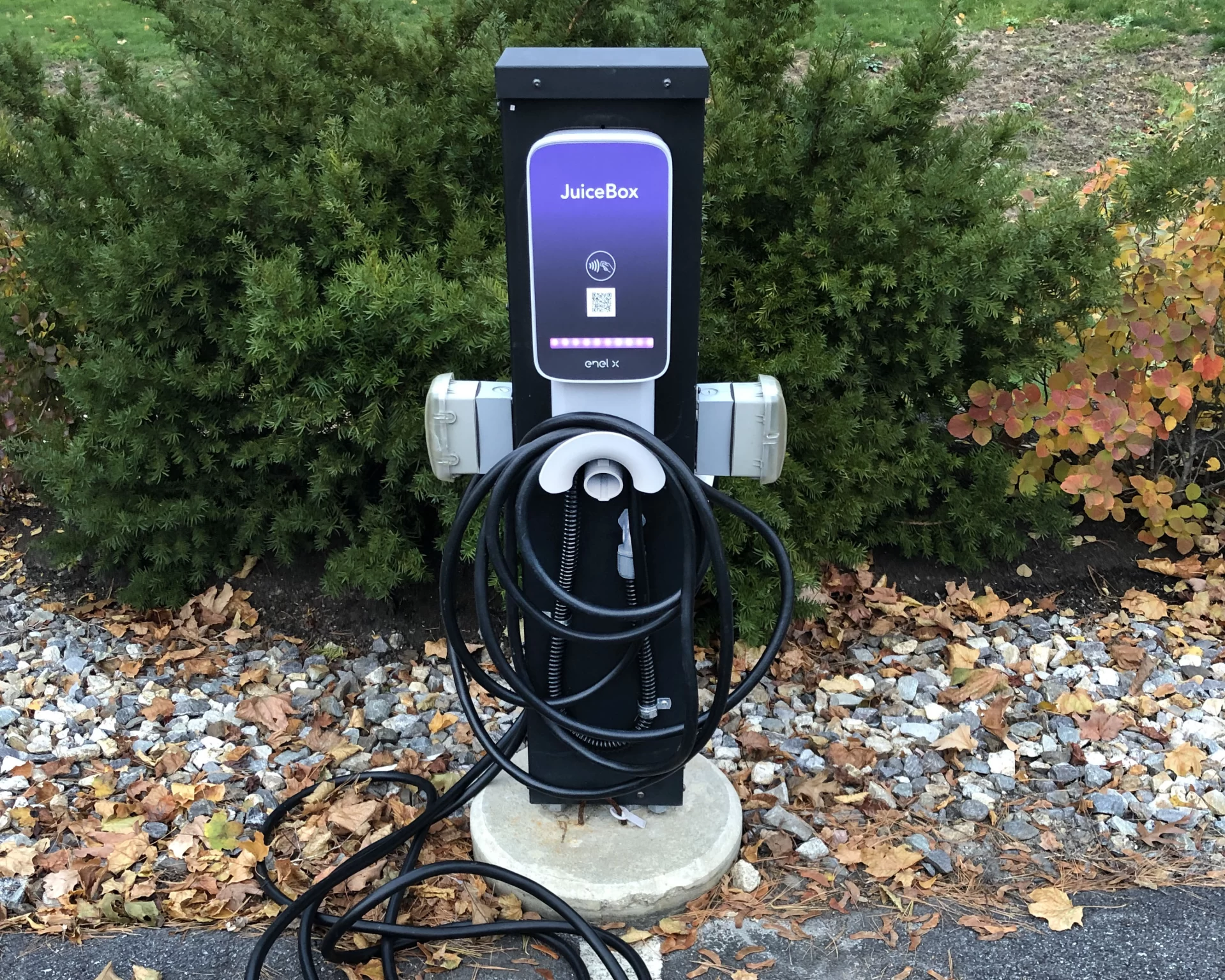
The chargers also connected to a cell phone app that charged drivers money for the electricity they used, a key incentive in encouraging people to move their fully-charged cars off the chargers, making them available to others.
But when Enel X unexpectedly ended its North American operations earlier this fall, chargers installed across North America became “dumb,” no longer able to communicate data with the network or charge EV users for electricity.
With an eye on fixing the problem while expanding the college’s EV charger offerings, Carriere and Meyer went to work. With an idea prepared and the support of Tom Twist, who is the college’s assistant director of sustainability, Carriere, Martin, and Larson identified a grant opportunity through Efficiency Maine.
The grant program provides funds to public-facing institutions to purchase and install Level 2 EV chargers, the second-fastest level of chargers among three tiers, in community areas where drivers frequently congregate. “Bates is nicely positioned to have chargers that are accessible to the community because there are lots of areas to walk around while your EV is charging, and it’s conveniently fairly close to the highway,” Meyer says.
“The EcoReps program has been a great opportunity to learn how to move change forward.”
Martin Carriere ’25
Twist and the EcoReps submitted their grant proposal in October and within just a couple of days heard good news: Efficiency Maine had given preliminary approval to fund four new EV chargers for Bates. (Federal approval for the grant arrived early in January.) Additional funding was identified to update the existing 12 chargers.
ReVision Energy will install the new chargers from ChargePoint, the most popular brand for Level 2 chargers in the U.S., by June 2025. The new devices will properly charge users money for electricity use and communicate usage data.
The parking lot behind Merrill Gymnasium will have eight total charging stations, including one at an ADA compliant parking spot, and additional chargers will be located around campus behind Lane Hall, in front of Smith Hall, behind Kalperis Hall, and behind Bonney Science Center.
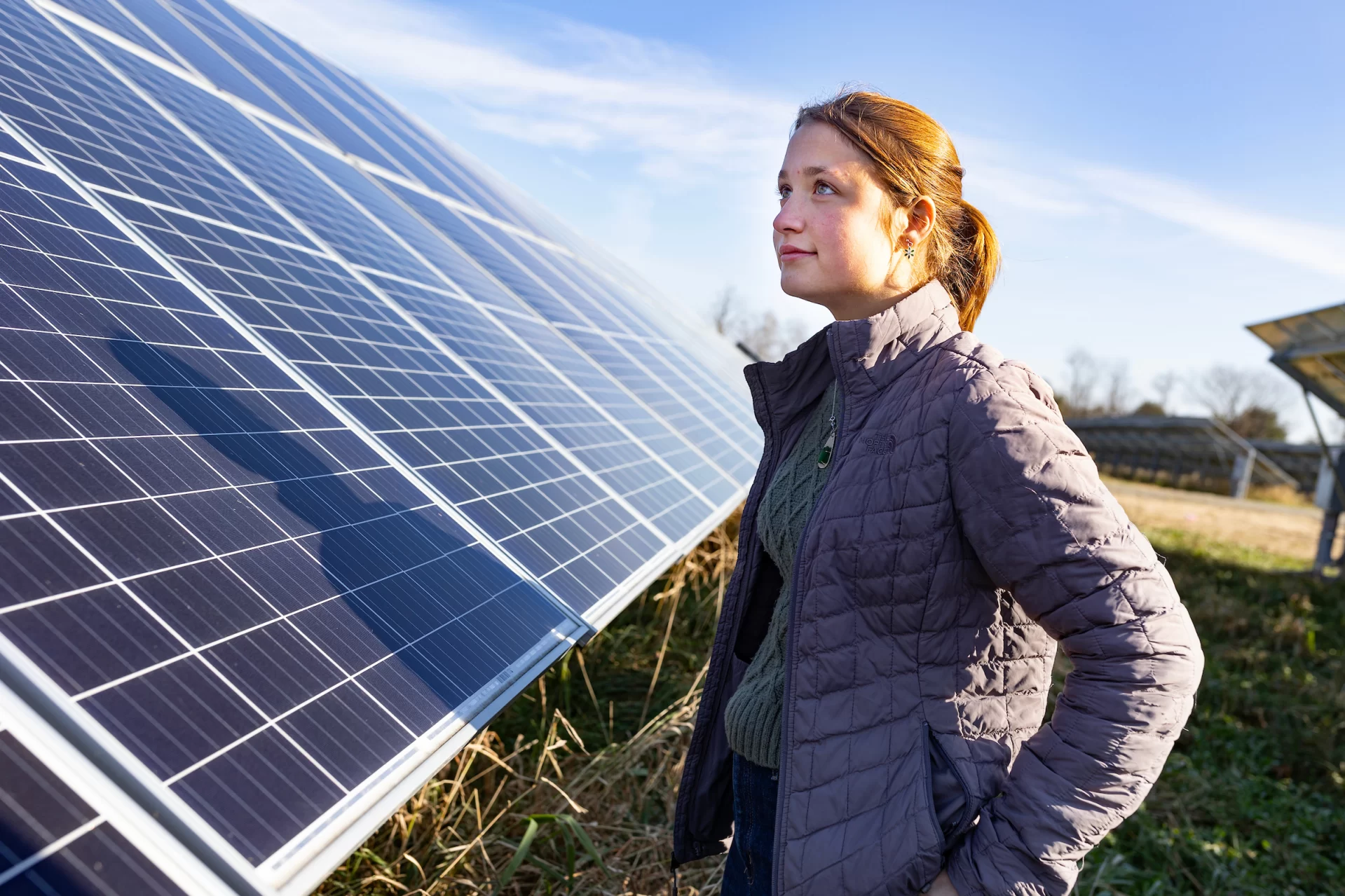
Improving EV charging is just one facet of Meyer and Carriere’s broader focus on energy efficiency and electrification as viable climate solutions. Pursuing such solutions with the EcoReps has been a successful way to put the serious, sometimes downbeat knowledge gleaned from environmental studies coursework toward actionable change.
“The EcoReps program has been a great opportunity to learn how to move change forward,” Carriere says. “Tom’s been so fantastic in allowing us to take a role where we have some say.”
Both students have been involved in climate action since high school — Carriere researched waterfowl and wildlife conservation, and Meyer started the environmental justice club at her high school — but have found their work in energy to be the most rewarding avenue for making change.
“Working in the energy sector, it feels like you’re making tangible progress,” Meyer says. “The projects that you are engaging in move the needle a little bit more than other things that I’ve done in the environmental sector.”
At Bates, Meyer and Carriere are working against the backdrop of a college that has gained recognition for promoting environmental responsibility. In 2024, the American Association of Sustainability in Higher Education recognized Bates’ sustainability achievements, ranking the college No. 10 in overall sustainability out of 1,200 schools in 52 countries
Meyer and Carriere have helped advance Bates’ Sustainability Roadmap from several angles. Last year, they helped identify funding through the Inflation Reduction Act’s federal direct pay incentive, available to nonprofits, and tapped into an Efficiency Maine initiative to successfully add eight new electric vehicles to Bates’ fleet.
The students worked closely with the Casco Bay Ford dealership and Bates Facility Services to purchase a Ford E-Transit van, a new Ford F-150 Lightning pick-up truck, two Nissan Leafs, a Chevrolet Blazer, and three low-speed vehicles.
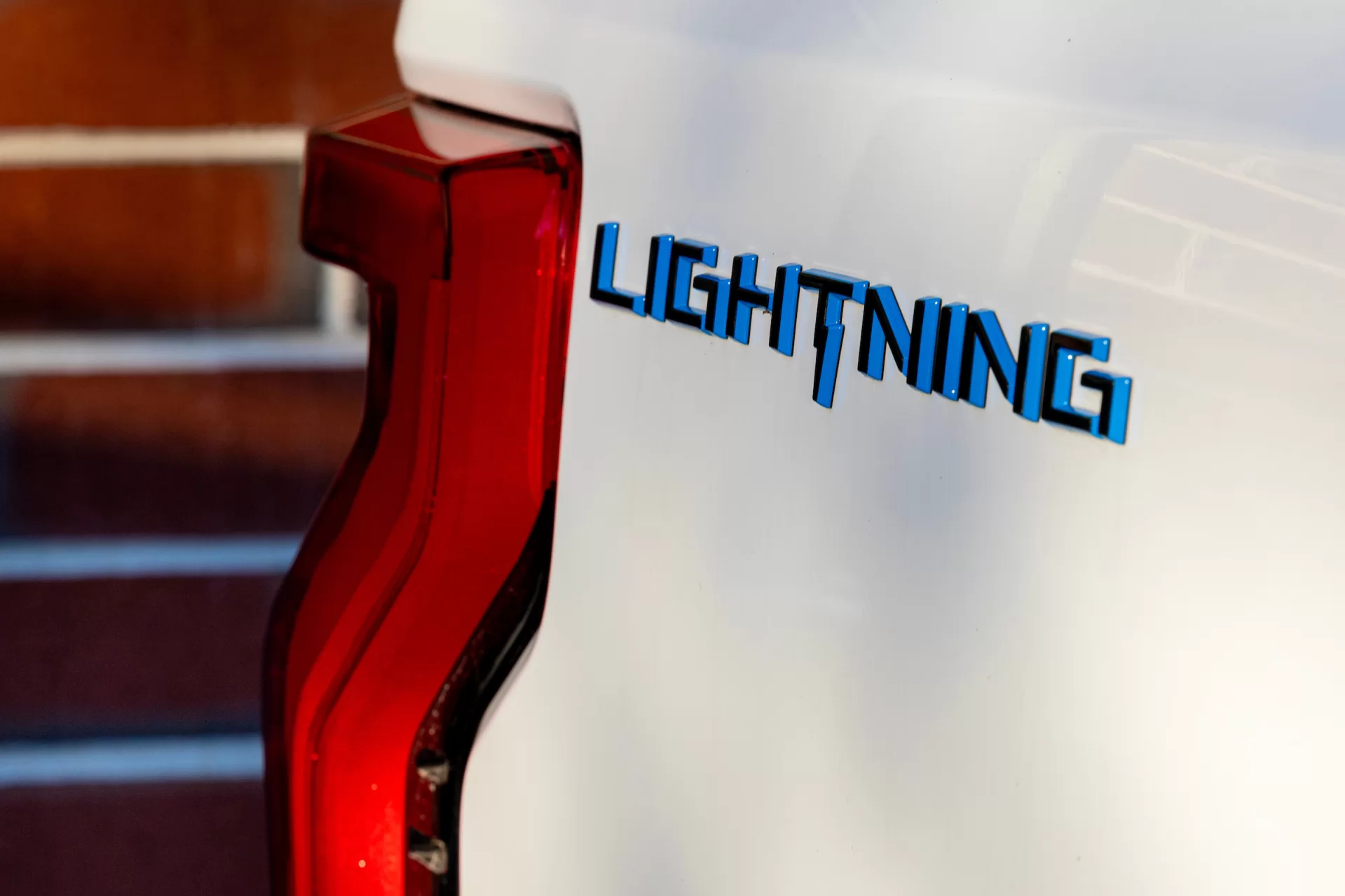
After successfully bringing both EVs and their chargers to campus, Carriere and Meyer are now focused on the Sustainability Roadmap’s goal of using 100 percent local and renewable energy by 2045. Currently, about 75 percent of Bates’ electricity is powered by the college’s 18,500-panel, 7.13-megawatt solar array northeast of Lewiston in Skowhegan.
Carriere and Meyer are working with campus leaders to address the final 25 percent needed to meet Bates’ goal and are currently interested in the possibility of installing solar panels atop a campus building. Like other sustainability initiatives, implementing solar provides ancillary benefits.
“From our perspective, having solar on campus would be super cool and compelling for admitted students, prospective students, and the students on campus to feel more connected to their energy use,” Meyer says.
The students’ close working relationship with Facility Services has been enormously helpful in completing their various projects, Carriere and Meyer say. Tim Pratt, director of Facility Services operations, and Jay Phillips, the previous director — both present and past members of the CER, respectively — were both open to bringing EVs on campus and hearing the students’ proposals.
“They’ve been fantastic to work with,” Carriere says. “We’ve had to do no convincing of why EVs are important. As long as we can show them that it’s a strong financial comparison to the internal combustion engine, then they’re like, alright, let’s do it.”
Chris Streifel, director of capital planning and construction, and Jason Hehlo, energy manager, have also worked closely with the students to identify clean energy areas of improvement.
Now in the final days of their undergraduate careers, as Meyer and Carriere wrap up their fervent environmental work at Bates, they are looking to their futures. Longterm, both students hope to pursue careers in energy.
“Working in a sustainability role for municipal government is my dream job,” Carriere says. “You can have direct impact on people’s lives.”
Meyer hopes to work on large renewable energy development projects in a corporate position.
“Seeing Tom Twist in his role has inspired me to want to work in the sustainability office of a corporation,” she says. “Being able to choose what projects to take on and moving corporations toward a more sustainable future by making compelling economic arguments is something that I’ve learned through the EcoReps.”
The weekend after finals, both graduating students will leave Maine for California; Carriere is heading home to Davis to spend time with family, while Meyer heads to the mountains around Lake Tahoe to teach adaptive skiing for the winter season.
Though Carriere and Meyer will be on the other side of the country, they’ll leave behind legacies of their time at Bates: brand-new chargers, staff driving around campus in quiet cars, and maybe even prospective Bobcats marveling at solar panels during campus tours.




